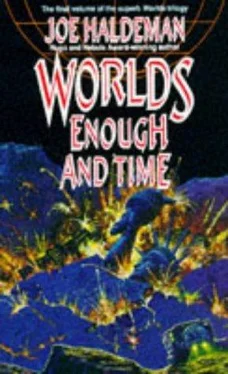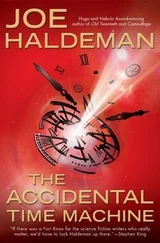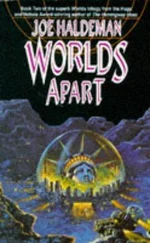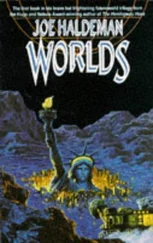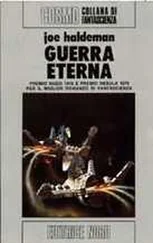“Then what was Berrigan pointing at?” Viejo said. “A computer program?”
“Might have been their monitor,” Seven said, “going blank just before ours did.”
Eliot shook his head. “This is all guesswork. We can’t make a decision based on ‘what-if’ speculation.” He turned to Seven. “Even if they are alive and need help, what could we give them, realistically?”
“Manpower. Brainpower. A few thousand good engineers and scientists.”
“They’ve got plenty left over. They also have a lot more redundancy in their information systems. If they’re alive, they’ll be back in shape long before we will.”
“You have a nice way of simplifying things, Eliot.” Carlos Cruz, Humanities, stood up. “If we don’t hear from them, they’re dead, so we should go on. If we do hear from them, they’ll be okay, so we should go on.”
Eliot smiled broadly. “Am I wrong, though?”
“I’m just saying that it’s not that simple. The question you’re not asking is whether we have a moral obligation to help New New.”
“So do we?”
“I say yes.”
Eliot paused and chose his words slowly. “I wouldn’t say yes or no categorically. The decision will have to be tempered by practical matters. What would you do, for instance, if we got a weak message pleading that we turn around and come back—saying they needed our antimatter to fuel their life support systems?”
“No question. We’d have to go back.”
An engineer laughed; Eliot restrained himself. “Well, that was kind of a trick question. By the time we decelerated, then accelerated back up to speed, then flipped and decelerated again… there wouldn’t be hardly any anti-matter left. And it would be at least three years before we got back to them, blasting every inch of the way; if they could hold out that long, they could juryrig some solar energy source. That’s not even considering what I think would be the most likely scenario—that the message was a hoax, an attempt to lure us back into the arms of the people who tried to kill us. That is what they did, even if their intent was something more subtle.”
“And we’re not out of danger yet,” Viejo said, “not by a long way. Personally, I think that if New New calls, we should ignore them.” There was a low murmur of support.
“Let’s not spend too much time on hypothetical situations,” Seven said. “First we have to decide our best course of action if we don’t hear from them in the next two months.”
“What if we shut down the drive now?” O’Hara said. “That would give us more than two months’ leeway.”
“About five,” Eliot admitted. “But you gotta keep in mind this is no shuttle tug you can turn on and off. Every time we deviate from the planned program we’re inviting trouble.” He looked around. “Show of hands? How many want to turn it off now?”
Only seven raised their hands, O’Hara and one other giving the thumb-and-finger “split-vote” sign. One of them was the propulsion engineer Sato. Eliot nodded at him. “I know what you’re going to say. Go ahead and say it.”
“Yes. Eliot and I have argued about this. Several of us believe we can modify the drive; double its efficiency. This would increase our acceleration by the square root of two. Or even quadruple the efficiency, doubling our acceleration, which would save us thirty-four years of travel time. Many of you would still be young when you arrived at Epsilon.” Sato was over ninety.
“But all of your research materials are gibberish.”
“The more reason to stop accelerating now. To buy time while those materials are deciphered. If it develops that we can indeed double or quadruple the efficiency, then right now we’re wasting antimatter at an alarming rate.”
“That’s rather interesting,” Seven said. “Eliot, you didn’t tell me about this.”
“I thought you knew.”
“No.” She rubbed her chin. “I think we ought to adjourn for a day, two days. Sato, you prepare a summation of your argument, and Eliot or somebody he chooses can do a rebuttal. Try to do it in English, not just math and jargon, so we mere mortals can comprehend it. Send it to all the Cabinet members. We’ll reconvene here Thursday morning, same time. Is that satisfactory, Eliot?”
“Sure. You can try to convince me.”
Sato inclined head and shoulders toward Eliot in a microscopic bow. “You may surprise yourself, Coordinator.”
27 September 98 [6 Chang 293]—So this is what it feels like not to be accelerating. It’s nothing obvious, down here in full gravity; just the absence of an insistent ghost of a pull. Dan insists it’s all psychological. Except that dust balls don’t gather on the sternward wall. No doubt it’s a lot more noticeable up in zero gee. Normally, if you stay perfectly motionless in one of the fuckhuts (in which case you ought to relinquish it to someone else), you’ll drift to the sternward wall in about a minute.
I get the feeling the engineers sort of ganged up on Eliot. John and Dan were in favor of Sato’s proposal from the start. Just about everyone I’ve talked to thought it would be worth the risk, including, emphatically, the pilot Anke Seven. Since he’s Tania’s cousin (and rather more, I happen to know) he gets about ten votes.
They turned the drive off at midnight, six hours ago, and we’re still here. Of course firing it up again is going to be a more dangerous proposition. I think I’ll suggest that they not tell anybody ahead of time. No need for all of us to sit around chewing our nails. It couldn’t be all that painful, anyhow, being instantly converted into a superheated puff of plasma. Unless dying always hurts.
Better get some work done. Gynecologist appointment in three hours. Just thinking about it makes me tingle with anticipation.
After the routine peek and poke, O’Hara dressed and met the gynecologist in his office. “You seem to be in very good health.” He paused. “How do you like surprises?”
“From doctors, not at all.” She sat down, braced.
“Try this: you’re going to have a baby.”
“What?” O’Hara stared at him. “How can I be pregnant when I don’t have any ova?”
He smiled. “I don’t mean the old-fashioned way. I suspect a lot of women will react like that. It’s just that your name came up to be an ovum donor for the first generation. So as long as you approve, we’ll thaw one out, quicken it, and either pop it into your uterus or cook it up here.” The colonists had enough ova and sperm filed away to populate an entire solar system.
“But I thought it was going to be five years, at least.” The plan had been to have “generations” of about two hundred people in years 5, 7, and 9, and then do it again about twenty years later. “Is this some kind of a morale thing?”
“I don’t know; I just see directives. And hear rumors. You’re in the Cabinet, aren’t you?”
“It hasn’t come up recently. We’ve been busy.”
“My guess, it’s a combination of mortality and morale. We’ve had a lot more deaths than were projected. And having kids around would raise people’s spirits.”
“Yeah, if you’re a pediatrician or a pederast. I prefer peace and quiet.” She relaxed back into the chair. “At least here, I wouldn’t have to raise the creature myself.” ‘Home had a creche with professional mothers and fathers.
“All you have to do is sign the consent form. Decide whether you want the embryo implanted or grown ex utero: ”
“You need a decision right now?”
“No; a couple of weeks. You might want to talk it over with your husbands.”
Читать дальше
